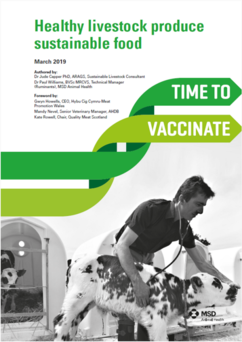Time to Vaccinate – Looking Beyond Antibiotics
Antimicrobial resistance has been widely highlighted as one of the most urgent problems of our time. Alongside the medical profession, livestock farming has a part to play in slowing the speed at which treatment-resistant microorganisms develop.
Through our Time to Vaccinate initiative, MSD Animal Health is committed to supporting farmers to move towards a more preventative approach on farm, and therefore protect animal health and welfare and reduce the need for antibiotic use within the industry.
British farmers have already demonstrated commitment to the responsible use of antibiotics. The UK One Health Report showed that tonnage use of antibiotics decreased by 35% in animals between 2013 and 2017. This reduction can be attributed to greater uptake of preventative measures, including vaccination to protect animals against future infection and high standards of biosecurity, hygiene and housing.
Vaccination has always played a role in modern livestock farming by helping to control infectious disease, and by doing so reduce the need for treatment.
Our white paper Time to Vaccinate – Looking Beyond Antibiotics explores the potential for vaccination to reduce the spread of infectious disease, therefore reducing the need for antibiotic use, and identifies the opportunities to raise vaccination rates across the cattle, sheep and pig industries.
The whitepaper is a collaboration between leading animal health experts which provides a comprehensive analysis of the scientific evidence in favour of vaccination and other preventative healthcare measures, to help reduce the need for antibiotics. It is also a call to policy makers to support farmers in looking beyond antibiotics.
Time to Vaccinate emphasises that there should be a focus on controlling infectious diseases through proactive and robust prevention programmes in which vaccines play a crucial role. Through the campaign, we hope that farmers and their veterinary surgeons feel empowered to make informed decisions about vaccination as part of their overall animal health plans.
Healthy Livestock Key To Future Sustainability Of Agriculture
With the global population set to grow to 9.8 billion by 2050, we need to produce more food from fewer resources with the smallest possible impact on the environment. Current estimates show 20% of animal production worldwide is lost as a result of disease and has serious economic impact which can be reduced through better animal health.
For example:
- Infectious bovine rhinotracheitis [IBR] costs the cattle industry £200 per sub-clinically infected cow, while increasing greenhouse gas emissions per kilogram of energy corrected milk by 8%
- Porcine respiratory and reproductive syndrome [PRRS] can decrease gross margins by 12 to 74% on pig farms, and reduce annual output by 15%, resulting in increased resource use per unit produced
“A healthy animal will produce a higher yield per unit of input, while having also increased overall productivity and lifespan”
Dr Paul Williams.
Our second white paper Healthy livestock produce sustainable food looks at how prioritised animal health can improve productivity and sustainability to meet the challenge of future food security. It is co-authored by Dr Paul Williams of MSD Animal Health and Dr Jude Capper, livestock sustainability consultant.
The white paper outlines how productive, sustainable livestock farming can be achieved by balancing three necessary components: Economic viability, environmental responsibility and social acceptability.
Benefits of healthy livestock:
- They are the most productive and economically viable, achieving increased growth rates, milk yields or egg production from each unit of input
- Improved fertility, longer lifespans and better quality carcases
- Smaller carbon footprint – they produce more food from fewer resources with the emission of fewer greenhouse gases
Healthy livestock will cultivate a thriving UK food and farming sector which offers food security and high quality, home-produced food.
Download the whitepaper
References
- Veterinary Medicines Directorate (VMD). 2017. UK – Veterinary Antibiotic Resistance and Sales Surveillance Report.
- Responsible Use of Medicines in Agriculture Alliance (RUMA). 2017. Targets Task Force Report 2017.







